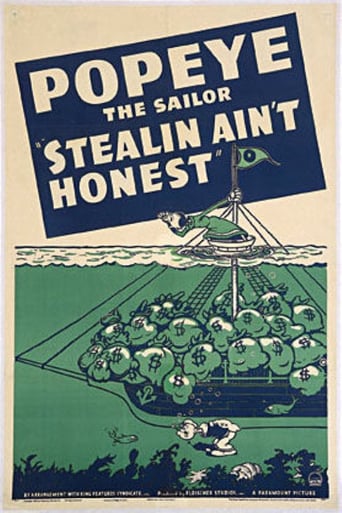Michael_Elliott
Stealin Ain't Honest (1940) *** (out of 4)Fast and fun short has Popeye and Olive Oyl discovering a treasure map but sure enough Bluto spies on them and discovers the location. Now it's a race to the gold.STEALIN Ain't HONEST runs right at five-minutes so it's a very short film and it runs extremely fast as it seems every is on speed and rushing through things. This makes for an entertaining film even though the story itself really wasn't anything fresh or original. There were several funny moments but the highlight is obviously the violence where Bluto and Popeye are beating each other to a pulp. As you'd expect the animation is top-notch.
ccthemovieman-1
Olive has a treasure map and it doesn't take much to convince Popeye to sail there and go look for the loot. Actually, she says she already owns the little island and the rights to anything found are hers. Bluto, naturally, butts in. He comes from out of nowhere in his little speed boat, photographs the map and then races to the island, slightly ahead of Popeye and Olive.From that point, its another race to see who can find the treasure. Sight gags are the main thing here, as nuggets and gold bars are found and quickly turned into coins and bags of money with just one slug from the ax of Popeye. Just grabbing the gold turns it into gold. You have to really stretch your imagination in this one, but it's a cartoon so who cares if it doesn't make sense? These are three very greedy people who can't love this money any more than they do here, but the fun is watching them fight over it.Yes, it's a bit dated but it was still entertaining. Most Popeye fans should enjoy it to some degree.
Mary-18
Not one of the finer members of the Popeye canon. Popeye and Olive fight Bluto over access to a gold mine, which lamely is full of gold coins lying on the ground. Popeye and Bluto have some half-hearted fighting over the gold, while Olive prances around like an idiot putting it in her basket. Also, this is one of the more dated Popeye cartoons, heavily laden with references to early standard tunes and the frequent use of the word "claim jumping."

